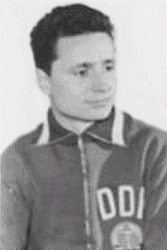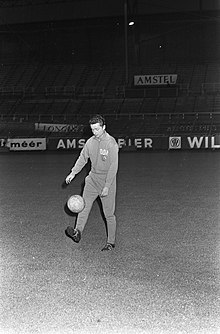Dieter Erler
| Dieter Erler | ||
 Dieter Erler (1964)
|
||
| Personnel | ||
|---|---|---|
| birthday | May 28, 1939 | |
| place of birth | Glauchau , German Empire | |
| date of death | April 10, 1998 | |
| Place of death | Chemnitz , Germany | |
| size | 177 cm | |
| position | midfield player | |
| Juniors | ||
| Years | station | |
| 1953-1956 | BSG Chemie Glauchau | |
| Men's | ||
| Years | station | Games (goals) 1 |
| 1956 | BSG Chemie Glauchau | 8 (4) |
| 1957-1958 | BSG Wismut Gera | 49 (13) |
| 1959-1963 | SC Wismut Karl-Marx-Stadt | 112 (36) |
| 1963-1972 | SC / FC Karl-Marx-Stadt | 208 (23) |
| National team | ||
| Years | selection | Games (goals) |
| 1956-1957 | GDR U-18 | 6 (0) |
| 1958-1960 | DDR U-23 | 4 (0) |
| 1959-1968 | DDR Olympia | 5 (0) |
| 1959 | GDR B | 1 (0) |
| 1959-1968 | GDR | 47 (12) |
| Stations as a trainer | ||
| Years | station | |
| 1975 | FC Karl-Marx-Stadt | |
| 1 Only league games are given. | ||
Dieter Erler (born May 28, 1939 in Glauchau , † April 10, 1998 in Chemnitz ) was a football player in the GDR . In the top division of GDR football , the Oberliga, he played for SC Wismut Karl-Marx-Stadt and SC / FC Karl-Marx-Stadt . He was twice GDR soccer champion and was a 47-time national player for the DFV . In 1967 he was named Footballer of the Year .
League player
Erler started playing soccer at BSG Chemie Glauchau in 1953 and played there until 1957. At the age of 17 he was already playing with the men's team in the second-rate first division . After completing an apprenticeship as a boiler and container Bauer, joined the season in 1957 to BSG Wismut Gera before joining the after two seasons at the beginning of 1959 Oberliga side SC bismuth Karl-Marx-Stadt joined. The 1.77 meter tall Erler played his first league game for Aue on March 1, 1959 in the floodlit home game against Lok Stendal in Leipzig's central stadium, where he was called up as a right half-forward in the 2-0 win. At the end of the season, SC Wismut had won the championship, Erler had been used in all 26 championship games. When SC Wismut was dissolved at the end of the 1962/63 season and its football department was downgraded to the second-tier company sports association Wismut Aue , Erler left Aue after 112 league games with 36 goals and joined the new regional football focus SC Karl-Marx-Stadt .

Erler was immediately used from the first day of play as a midfield director for SC Karl-Marx-Stadt in the league and then completed all the point games of the 1963/64 season. In 1965 he and his team were transformed into a pure football club , FC Karl-Marx-Stadt, and with this, in 1967, surprisingly and superiorly, they became GDR champions. As the team captain with 21 matches and five goals, he played a key role in the success. In 1970 he had to relegate with FCK after a penultimate place in the league and then spend a year in the second-rate GDR league. There he completed all 30 point games and was thus decisively involved in the immediate resurgence. Meanwhile 32 years old, Erler played the league season 1971/72 with 25 appearances and then ended his career as an active soccer player. In Karl-Marx-Stadt he had completed 178 league games, so that together with his time in Aue he made a total of 290 first division appearances. With his 18 goals for FCK, he increased his total number of hits to 54.
International assignments

As a Glauchau player, Erler had his first selection apprenticeships. On October 13, 1956, he played his first international game with the GDR junior national team , in which the later Wismut-Gera player was used in a total of six official international games until 1957. Between 1958 and 1960 he played four international matches with the youth national team . In May 1959 he played with the B national team against the B selection of Hungary (1: 3). In the DFV Olympic selection , Erler was a total of five times in the qualifying games for Rome and Mexico City on the ball, but could not qualify for the Olympic football tournament with the East German team in 1960 or 1968 . For Tokyo he was not part of the Olympic squad, which secured the bronze medal in Japan under the all-German flag.
Almost two months later, on June 28, 1959, he was in the senior national team for the first time in the qualifying match for the European Championship in Porto against Portugal (2: 3) . He was then used in all of the following 24 international international matches, his last and 47th game - or 45 games according to FIFA's interpretation - with the national team he played on a tour of South America on February 2, 1968 in Santiago de Chile against Czechoslovakia ( 2: 2). This game went under unfortunate circumstances for Erler, who was the captain of the national team at the time. After a foul play, he was sent off by the referee, and then national coach Harald Seeger informed him that he had been relieved of his position as captain. Since Erler had difficulties with Seeger anyway, he then announced his resignation from the national team, for which he had also scored 12 goals.
As a two-time football champion, Erler also had the opportunity to play in the games of SC Wismut and FCK in the European Cup . In the 1960/61 cup season, Erler played three games against the Austrian champions Rapid Wien (1: 3, 2: 0, 0: 1). FC Karl-Marx-Stadt also only survived one round in the championship cup in 1967/68. Erler also played these two games against Belgian champions RSC Anderlecht (1: 3, 1: 2).
After competitive sport
After Erler retired as an active football player at FC Karl-Marx-Stadt, the club used him as a talent scout and junior coach. Erler had already obtained the sports teacher diploma at the Leipzig Sports University DHfK in the 1960s . From January to the end of August 1975 he was the head coach of the FCK league team. After three defeats at the start of the 1975/76 season, Erler was dismissed as coach. He later worked as assistant coach of the 1st team until 1988. After the fall of 1989/90 , Erler had to reorient himself professionally and took up a job at AOK Chemnitz. At Chemnitzer FC, successor to FCK, he continued to volunteer in the youth field. In 1997 Erler had to undergo heart surgery. He died of a heart attack at the age of 59.
Honors
In a coach survey carried out by the newspaper Deutsches Sportecho at the end of the 1962/63 season, Erler was named as the best half-right striker.
In 1967 he was voted footballer of the year by the sports editors of the GDR daily newspapers .
Chemnitzer FC made Erler an honorary member of the club in 1993.
GDR national coach Károly Sós about Dieter Erler: “He has everything: ideas, technology, intuition for goals, shrewdness, also toughness. I do think that there weren't many players in Europe in the mid-sixties who directed better than Erler. " (According to Horn / Weise, Lexicon of GDR football)
literature
- Andreas Baingo , Michael Hohlfeld: Soccer selection player of the GDR. The lexicon . Sportverlag Berlin , Berlin 2000, ISBN 3-328-00875-6 , page 41.
- Andreas Baingo , Michael Horn: The History of the GDR Oberliga. Verlag Die Werkstatt, Göttingen 2003, ISBN 3-89533-428-6 .
- Michael Horn, Gottfried Weise : The great lexicon of GDR football. Schwarzkopf & Schwarzkopf, Berlin 2004, ISBN 3-89602-536-8 .
- Lorenz Knierim, Hardy Greens : Encyclopedia of German League Football. Lexicon of players 1890-1963 . AGON Sportverlag, Kassel 2006, ISBN 3-89784-148-7 , page 76/77.
- Hanns Leske : Encyclopedia of GDR football . Verlag Die Werkstatt, Göttingen 2007, ISBN 978-3-89533-556-3 .
- Hanns Leske : The GDR league players. A lexicon . AGON Sportverlag, Kassel 2014, ISBN 978-3-89784-392-9 , page 98.
Web links
- Dieter Erler in the database of weltfussball.de
- Dieter Erler in the database of fussballdaten.de
- Dieter Erler in the database of the German Football Association
- Dieter Erler in the database of National-Football-Teams.com (English)
Individual evidence
- ^ Matthias Arnhold: Dieter Erler - Matches and Goals in Oberliga . RSSSF.com . July 26, 2012. Retrieved January 10, 2020.
- ^ Matthias Arnhold: Dieter Erler - Goals in International Matches . RSSSF.com . March 6, 2004. Accessed January 10, 2020.
| personal data | |
|---|---|
| SURNAME | Erler, Dieter |
| BRIEF DESCRIPTION | German soccer player |
| DATE OF BIRTH | May 28, 1939 |
| PLACE OF BIRTH | Glauchau , Germany |
| DATE OF DEATH | April 10, 1998 |
| Place of death | Chemnitz , Germany |
